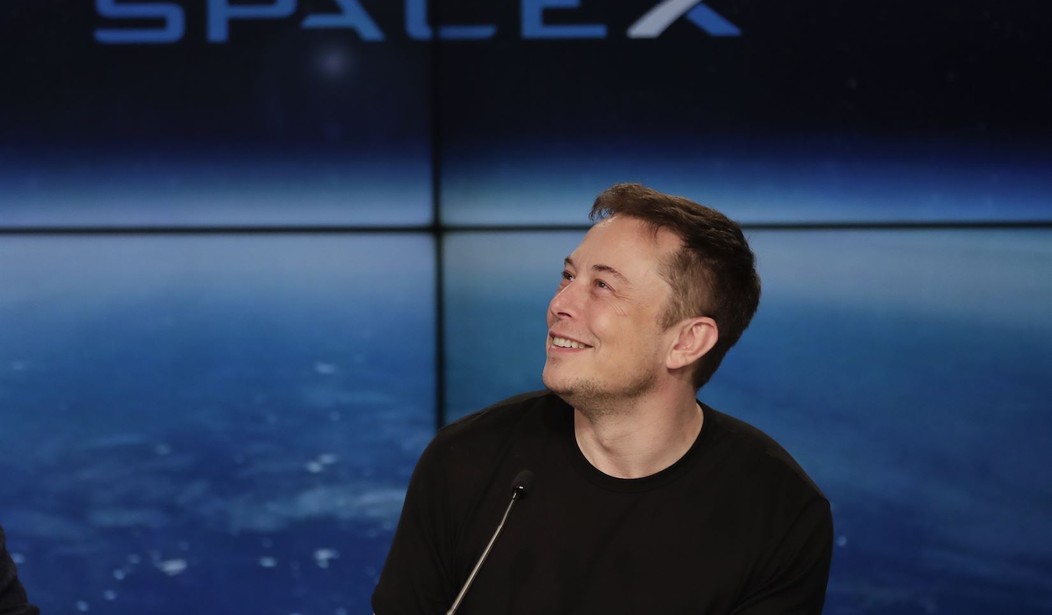There was a testy Twitter exchange last week between Bernie Sanders, the socialist Democratic U.S. senator from Vermont, and eccentric billionaire entrepreneur Elon Musk.
Sanders started by tweeting that Musk and Amazon founder and CEO Jeff Bezos have more wealth than "the bottom 40% of people in this country," a fact Sanders chalked up to "greed" and characterized as "immoral."
Musk replied and referenced his efforts to push the frontiers of space travel (with his company SpaceX), tweeting, "I am accumulating resources to help make life multiplanetary & extend the light of consciousness to the stars."
Sanders' response was both condescending and ignorant. "Space travel is an exciting idea," he tweeted, "but right now we need to focus on earth and create a progressive tax system so that children don't go hungry, people are not homeless and all Americans have healthcare. The level of inequality in America is obscene and a threat to our democracy."
Where to start?
First, the federal tax system is already progressive. Federal individual and corporate income taxes are progressive, as are estate taxes. Even payroll taxes are largely progressive.
Second, the left's talking points about "income inequality" generally leave out important facts. As author and financial analyst Helen Raleigh wrote in an article for The Federalist in 2019, the lowest-income households in America were receiving government transfers (Medicare, Medicaid, food stamps, etc.) equal to nearly 10 times their annual income. These transfers -- totaling more than $2 trillion annually -- are possible precisely because of the progressive nature of the federal income tax.
In other words, the rich already pay more.
Recommended
How much more? The top 1% of earners in the United States pay almost 40% of all income taxes. The top 10% pay 70% of all income tax. The wealthiest 50% of Americans pay fully 97% of all income taxes. And this does not take corporate income taxes, estate taxes or payroll taxes into account.
Third -- and most importantly -- Sanders never discusses how people like Musk and Bezos acquired the wealth they did; he condemns it as a function of greed. That is a falsehood of the worst sort. It is fashionable to hate on capitalism. But America has a culture of entrepreneurial capitalism unlike any other country on the planet. People here can start out poor as Job's turkey. But if they invent, innovate and produce goods and services that millions of people want -- and are willing to pay for -- those entrepreneurs can obtain wealth beyond their wildest dreams.
That is exactly what Elon Musk, Jeff Bezos and tens of thousands of other successful entrepreneurs have done, and our society is immeasurably better for it.
Most entrepreneurs do not develop life-altering, industry-changing inventions. But those who do are not merely indulging their tech-geek fantasies. The innovations they develop advance society and improve lives in ways not foreseen at the time they are created.
Take Wilbur and Orville Wright, for example. When the brothers were trying to make flying machines, they were viewed as crackpots. Only the most outrageously imaginative individuals alive at the time would have argued that such machines would save children's lives. But airplane flight has -- among countless other things -- enabled donated organs to reach children (and adults) who would die without them. And fruits and vegetables previously available only in tropical regions can now reach grocery stores and markets in northern climes, to the nutritional benefit of those who live there.
The same could be said of the internal combustion engine and the automobile. Before Henry Ford entered the picture, the automobile was a custom-made luxury available only to the very wealthy, much as a private jet is today. Ford's genius was to join the technology of the motorcar with automation, building factories that mass-produced automobiles, making them affordable to everyone. That innovation completely transformed society, making travel faster, easier and more comfortable -- and making possible the kinds of life-saving emergency services we take for granted now, including police cars, fire engines and ambulances.
The list of inventions and innovations that have made modern civilization what it is today would fill volumes of books. But almost all of them have current applications that even their creators did not envision. Certainly, no government functionary would have foreseen them.
That, right there, is the key to the success of entrepreneurship and innovation in America: It has not been centrally planned. The federal government provides strong support for innovation, spending billions of dollars annually on research conducted at universities, in the military, at national laboratories and in hospitals, and provides plenty of financial incentives for corporate research as well. (By way of example, former President Trump's request for research funding in his fiscal year 2020 budget was $134 billion.) But for the most part, the market, not the government, decides what will be produced and sold.
Sanders' tweets to Elon Musk reflect a dangerous attitude and suggest support for a system where politicians or bureaucrats decide whether and which and when innovations will be pursued. This is a prescription for failures we cannot anticipate. Countries that have tried command-and-control economies -- those where production and distribution decisions are made by the government -- have failed catastrophically, time and time again. Until an invention is created, it is impossible to know the myriad ways it will help society. If it is never created, we will never know what we've lost.
We should be leaving innovation to the innovators, not entrusting to politicians the decisions about what should and should not be made and commercialized. History shows that political leaders have an endless supply of ideas about how to enrich themselves, entrench their power, spend other people's money and kill their enemies, but are largely dull and unimaginative otherwise.
Innovators save lives. Politicians, not so much.

























Join the conversation as a VIP Member